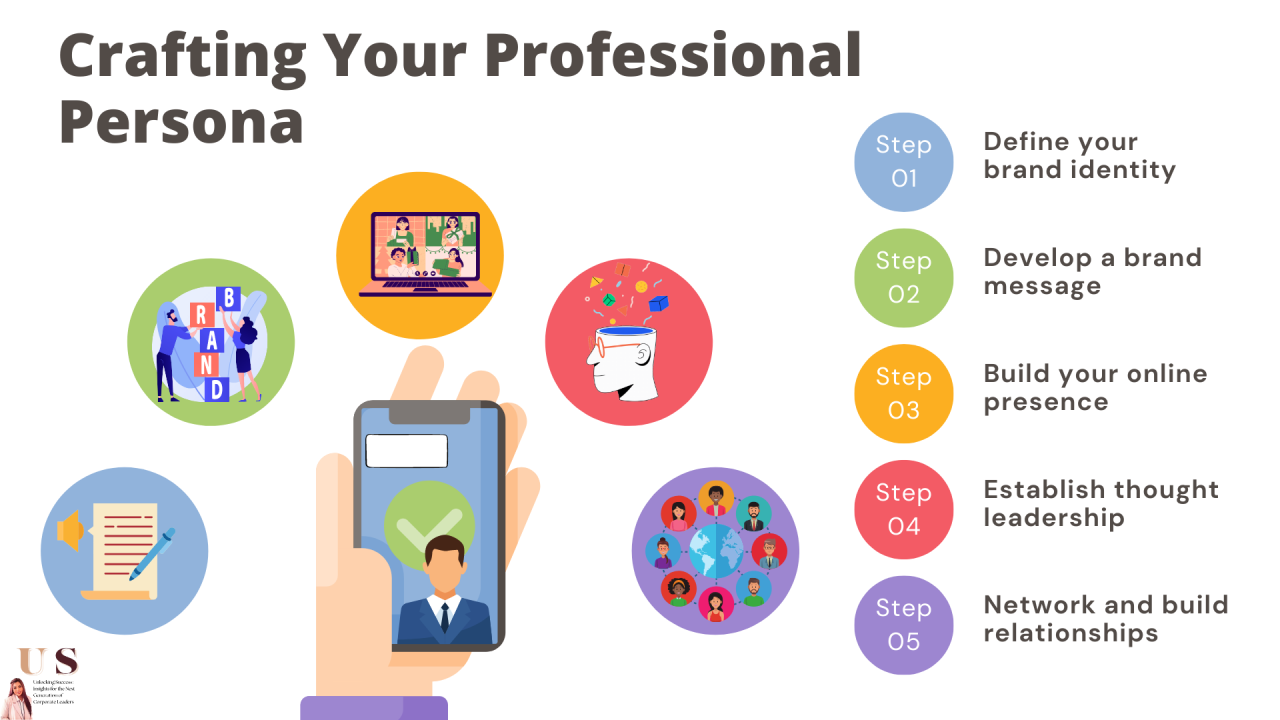In today’s competitive professional landscape, building a personal brand is no longer an option but a necessity. Whether you’re a seasoned professional or just starting your career, establishing yourself as an industry expert can significantly enhance your career prospects and open doors to new opportunities. This article will guide you through the process of crafting a personal brand that positions you as a thought leader in your field.
Understanding Personal Branding
Before diving into the strategies, it’s essential to understand what personal branding entails. Personal branding is the practice of marketing yourself and your career as a brand. It involves creating a unique identity that resonates with your target audience and sets you apart from the competition.
“Your brand is what other people say about you when you’re not in the room.” — Jeff Bezos
When done correctly, personal branding can lead to increased visibility, credibility, and influence within your industry. It’s not just about self-promotion; it’s about consistently delivering value and establishing trust with your audience.
Identifying Your Unique Value Proposition
The first step in building a personal brand is identifying your unique value proposition (UVP). Your UVP is what sets you apart from others in your field. It’s the combination of your skills, experiences, and personality that make you uniquely qualified to solve specific problems or address particular needs.
To identify your UVP, ask yourself the following questions:
- What are my core strengths and skills?
- What unique experiences or perspectives do I bring to the table?
- What problems do I solve for others?
- How do I want to be perceived by my audience?
Once you have a clear understanding of your UVP, you can begin to craft a personal brand that reflects these qualities.
Crafting Your Personal Brand Statement
Your personal brand statement is a concise description of who you are, what you do, and what makes you unique. It should be memorable, authentic, and aligned with your UVP. Here’s a simple formula to create your personal brand statement:
[Your Name] is a [Your Profession] who [Your Unique Value Proposition].
For example, “Jane Doe is a marketing strategist who helps startups scale their businesses through data-driven campaigns.”

Building an Online Presence
In the digital age, an online presence is crucial for establishing yourself as an industry expert. Your online presence includes your website, social media profiles, and any content you create or share. Here are some key steps to building a robust online presence:
Create a Professional Website
Your website is the cornerstone of your online presence. It should serve as a hub for all your professional activities, including your portfolio, blog, and contact information. Make sure your website is:
- Professional: Use a clean, modern design that reflects your brand.
- User-friendly: Ensure it’s easy to navigate and mobile-friendly.
- SEO-optimized: Use relevant keywords to improve your search engine rankings.
Leverage Social Media
Social media platforms like LinkedIn, Twitter, and Instagram can help you connect with industry peers, share your expertise, and build your personal brand. Here’s how to make the most of these platforms:
- LinkedIn: Share industry insights, engage with relevant content, and participate in professional groups.
- Twitter: Use Twitter to share quick thoughts, retweet valuable content, and engage in industry conversations.
- Instagram: Use Instagram to share behind-the-scenes content, showcase your work, and connect with a visual audience.
Create and Share Valuable Content
Content creation is a powerful way to establish yourself as an industry expert. Whether it’s blog posts, videos, or podcasts, consistently creating and sharing valuable content can help you build a loyal audience. Here are some tips for effective content creation:
- Focus on Quality: Ensure your content is well-researched, informative, and free of errors.
- Be Consistent: Regularly publish content to keep your audience engaged.
- Engage with Your Audience: Respond to comments, ask for feedback, and build a community around your content.
Networking and Collaboration
Networking is a critical component of building a personal brand. By connecting with other professionals in your industry, you can expand your influence, gain new insights, and open doors to new opportunities. Here are some strategies for effective networking:
Attend Industry Events
Conferences, seminars, and webinars are excellent opportunities to meet industry peers, learn about the latest trends, and showcase your expertise. Make sure to:
- Prepare: Research the event and identify key speakers or attendees you want to connect with.
- Engage: Participate in discussions, ask questions, and share your insights.
- Follow Up: After the event, reach out to the people you met and continue the conversation.
Collaborate with Other Experts
Collaborating with other industry experts can help you expand your reach and credibility. Consider co-authoring articles, hosting webinars together, or collaborating on projects. Collaboration not only enhances your personal brand but also provides valuable learning opportunities.

Demonstrating Expertise Through Thought Leadership
Thought leadership is about sharing your unique perspectives and insights to influence and guide others in your industry. It’s a powerful way to establish yourself as an expert and build a loyal following. Here are some ways to demonstrate thought leadership:
Publish Articles and Whitepapers
Publishing articles and whitepapers on industry-related topics can help you establish credibility and showcase your expertise. Consider contributing to industry publications, guest blogging on reputable websites, or publishing your own whitepapers.
Speak at Conferences and Webinars
Speaking at conferences and webinars is an excellent way to share your knowledge and reach a broader audience. When preparing your presentation, focus on delivering actionable insights and engaging your audience.
Participate in Industry Panels and Discussions
Participating in industry panels and discussions allows you to share your perspectives and engage in meaningful conversations with other experts. It’s also an opportunity to learn from others and expand your network.
Measuring and Adjusting Your Personal Brand
Building a personal brand is an ongoing process that requires continuous measurement and adjustment. To ensure your personal brand is effective, you need to track your progress and make necessary adjustments. Here’s how to do it:
Set Clear Goals
Before you start, set clear, measurable goals for your personal brand. For example, you might aim to increase your social media following by 20% or secure a speaking engagement at a major industry conference.
Track Your Progress
Regularly track your progress towards your goals. Use tools like Google Analytics, social media analytics, and feedback from your audience to measure your success.
Seek Feedback
Feedback from your audience and peers can provide valuable insights into the effectiveness of your personal brand. Don’t be afraid to ask for feedback and use it to make improvements.
Be Flexible
The professional landscape is constantly evolving, and your personal brand should evolve with it. Be flexible and willing to adjust your strategies as needed to stay relevant and effective.
Place image 3 here
The Role of Authenticity in Personal Branding

Authenticity is a key component of a successful personal brand. Your audience can quickly sense inauthenticity, which can damage your credibility and reputation. Here’s how to maintain authenticity in your personal branding efforts:
Be True to Yourself
Your personal brand should reflect your true self. Don’t try to be someone you’re not just to fit in or appeal to a certain audience. Authenticity resonates with people and builds trust.
Stay Consistent
Consistency is crucial for maintaining authenticity. Ensure your messaging, content, and interactions are consistent with your core values and beliefs.
Be Transparent
Transparency builds trust and credibility. Don’t shy away from sharing your challenges, failures, and lessons learned. Authenticity means being open and honest with your audience.
The Importance of Patience and Persistence
Building a personal brand is not a quick process. It requires patience, persistence, and a long-term commitment. Here’s why patience and persistence are essential:
Building Trust Takes Time
Trust is the foundation of any successful personal brand. Building trust with your audience takes time and consistent effort. Don’t expect immediate results; focus on delivering value and building relationships over time.
Learning and Growth
Building a personal brand is also a journey of learning and growth. Be open to feedback, continuously seek new knowledge, and be willing to adapt and improve.
Staying Committed
The road to establishing yourself as an industry expert is filled with challenges and setbacks. Stay committed to your goals and keep pushing forward, even when the going gets tough.
Building a personal brand that establishes you as an industry expert is a multifaceted process that requires careful planning, consistent effort, and a commitment to authenticity. By identifying your unique value proposition, crafting a compelling personal brand statement, building a robust online presence, networking effectively, demonstrating thought leadership, and continuously measuring and adjusting your strategies, you can create a personal brand that resonates with your audience and positions you as a leader in your field. Remember, the key to success is patience, persistence, and a genuine desire to deliver value to your audience.








